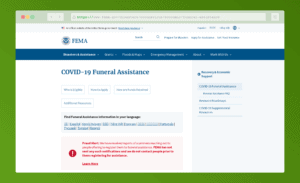For centuries, cremation was done one way – using fire. A body was placed on a funeral pyre that was then lit on fire as loved ones stood by watching. That option actually still exists today in one city in Colorado, but modern-day traditional cremation is very different. Incineration is still used, but now it’s done using a retort that heats up fossil fuels to temperatures that are high enough to incinerate the body.
The problem is traditional cremation comes at a high environmental cost. From the nonrenewable resources that are needed for incineration to the pollutants that are created, more and more people are demanding cremation that doesn’t come with the unwanted side effects.
Enter, water cremation.
While the concept of water cremation may be totally new to most people, it was actually first developed in 1888. For some time, water cremation has been used in the medical field whenever a body is donated to science. It’s so common that commercial water cremation chambers began being used by universities and medical centers in 2005.
While it’s legal for all medical research centers to use, water cremation isn’t legal everywhere in the U.S. for personal disposition. Here’s why and where water cremation is allowed currently.
What is Water Cremation?
Water cremation, also known as aquamation or alkaline hydrolysis, is one of the newest forms of disposition that’s being legalized across the country. Instead of using incineration in a retort, water cremation is performed with a pressurized chamber that’s filled with a solution that is 95% water and 5% alkaline.
The solution is non-toxic, but it will naturally decompose the body tissue after 4-6 hours of being heated at 300 degrees Fahrenheit. It’s essentially natural decomposition that’s accelerated through increased heat and pressure in a controlled setting.
The end result for the family is actually almost the same as traditional flame-based cremation. Only the bones remain at the end of the cremation and are ground up to create the cremated remains. However, families can expect to receive about 20%-30% more cremains with water cremation because more of the bone is preserved during the process.
How Safe is Water Cremation?
Water cremation has been used for over 130 years and is completely safe. In fact, it’s safer than traditional cremation for the funeral home and its workers since there’s no flame involved.
Water cremation is also safer for the environment. Aquamation is considered one of the greenest end of life services because:
- The process uses 90% less energy compared to traditional cremation.
- No smoke is generated during the process.
- No toxins are released into the air.
- The leftover solution is so safe it can be poured down the drain.
When it’s all said and done, water cremation’s carbon footprint is just one tenth of traditional flame cremation’s footprint. It’s a huge difference, which is why so many states have either already legalized water cremation or are currently in the process of doing so.
Is Water Cremation Legal in the United States?
Whether or not water cremation is legal is going to depend on the state. Each state has its own laws that regulate end of life services. As of this writing, 28 states have approved water cremation and more are considering it.
Water cremation is currently legal in:
- Alabama
- Arizona
- California
- Colorado
- Connecticut
- Florida
- Georgia
- Hawaii
- Idaho
- Illinois
- Kansas
- Maine
- Maryland
- Massachusetts
- Michigan
- Minnesota
- Missouri
- Nevada
- North Carolina
- Oklahoma
- Oregon
- Tennessee
- Utah
- Vermont
- Virginia
- Washington
- West Virginia
- Wyoming
A number of states that haven’t regulated water cremation yet have bills being considered that could legalize alkaline hydrolysis and regulate the process. Many other states are open to the idea but simply haven’t regulated water cremation yet. New York State is a perfect example. New York has legalized natural organic reduction but hasn’t officially given water cremation the okay yet.
Why Water Cremation Isn’t Legal in Every State
Right now you’re probably wondering why water cremation isn’t legal in all 50 states if it’s safer than traditional cremation and better for the environment. There are several factors at play:
- The technology is relatively new, and the unknown can seem scary to some people. Some states simply think there’s not enough data to allow alkaline hydrolysis to be legalized. However, now that water cremation has been used commercially for more than a decade this line of reasoning is no longer valid.
- Legalizing a new form of disposition isn’t at the top of the priority list for some states, so they are taking a wait and see approach.
- The Catholic Church is very much against the idea of water cremation based on personal beliefs. They have actually fought against alkaline hydrolysis bills that are introduced to state senates.
- Many funeral homes and casket makers don’t want the added competition that comes with water cremation. These groups have also joined efforts to block legislation from becoming state law.
Now that more than half of Americans can choose water cremation for their disposition there’s added pressure for the remaining states to follow suit. States that have already legalized water cremation point to the fact that the process has been proven to be safer than flame cremation. It’s also not surprising to see that the practice has been legalized in states that have been making the greatest efforts to fight climate change.
Water Cremation Legalization in Texas
A lot of people in our area wonder, why isn’t water cremation legal in Texas? At this point, the only reason legalization is being held up for water cremation is because of special interest groups that profit off of burial and the personal preferences of lawmakers.
Cremation.Green has joined the effort to ensure Texans have the same disposition options as their fellow Americans. We work with Live Free Die Free Texas to promote positive change in the funeral industry. We’re also outspoken advocates that work with local lawmakers to provide expertise.
Water Cremation may not be legalized by the Texas Legislation yet, but that doesn’t mean the option is unavailable to Texans. Cremation.Green has partnered with water cremation service providers in St. Louis, Missouri to arrange aquamation no matter where you live. Contact our team whenever is most convenient for you to learn more about how the process works.





